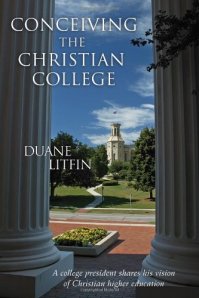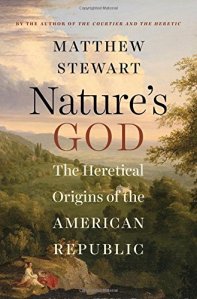Hello! I hope everyone had a wonderful Fourth of July yesterday.
I am going to interrupt my current focus on faith and the American founding for just a moment, as I can’t help addressing one current news item that’s generated considerable buzz in these parts. The school where I teach, Wheaton College, got mentioned quite prominently in the most current issue of The Chronicle of Higher Education. If you’re not familiar with this publication, the Chronicle is sort of like the New York Times of the academic world. Its target audience is primarily educators and administrators and public policy types, in addition to highbrow readers who want to follow the latest trends in higher education. For a small school like Wheaton, getting a shout-out from the Chronicle is big.
But big isn’t necessarily good, and the attention Wheaton received is a case in point. As it turned out, the college was exhibit A for the prosecution in a lengthy, inflammatory opinion piece titled “The Great Accreditation Farce.” The author is Dr. Peter Conn, a professor of English and education at the University of Pennsylvania. Conn is apparently an expert on accreditation because he participated in two accreditation reviews a decade or more ago. In 2003 he helped his own institution prepare for an accreditation review, and the following year he was invited to be on the external accreditation committee charged with evaluating Johns Hopkins.
Conn’s title got my attention, as I confess I am more than a little skeptical of the accreditation process myself. Any school interested in pursuing excellence should both seek and welcome outside feedback on a regular basis. But because federal financial aid is prohibited to students attending non-accredited institutions, the accreditation process in its current form is, among other things, a Trojan horse for increased federal control of state and private institutions. Considering all forms of aid, the U. S. government distributed nearly a quarter of a trillion dollars to college and university students during the 2012-13 academic year. In today’s academic marketplace, rare is the college or university than can survive if its students are barred from federal aid. This gives enormous leverage to the federal government, and I think it has more than enough of that already.
Conn has a very different set of concerns, however, as I soon learned. The great “farce” at the heart of the accreditation process consists of the ridiculous practice of accrediting religious institutions. “By awarding accreditation to religious colleges,” the author writes, “the process confers legitimacy on institutions that systematically undermine the most fundamental purposes of higher education.” This is because “skeptical and unfettered inquiry is the hallmark of American teaching and research.” It is “obvious” to Conn that “such inquiry cannot flourish” inside a religious institution.
Conn reserves his greatest scorn for Christian colleges–like Wheaton, which he singles out specifically–that require their faculty to sign statements of religious faith. Such “intellectually compromised” schools are institutions for brain-washing the faithful, not pursuing the life of the mind. “At Wheaton,” Conn explains, “the primacy of reason has been abandoned by the deliberate and repeated choices of both its administration and its faculty.”
Lest the reader misconstrue, Conn makes clear–with calculated condescension– that he has “no particular objection to like-minded adherents of one or another religion banding together, calling their association a college, and charging students for the privilege of having their religious beliefs affirmed.” He does have “a profound objection,” however, “to legitimizing such an association through accreditation.” Call it whatever you like, in other words, just don’t pretend that such a place is characterized by academic freedom and intellectual integrity. In short, Conn concludes, “Providing accreditation to colleges like Wheaton makes a mockery of whatever academic and intellectual standards the process of accreditation is supposed to uphold.”
Wheaton’s provost, Dr. Stan Jones, has already published an eloquent reply to Conn’s polemic. Consonant with his character, Jones’ comments are judicious, balanced, and unfailingly gracious, and I could not begin to improve on them, but I do want to share a personal testimony of sorts. In his response, Jones notes that when Wheaton College “hires colleagues away from nonreligious institutions, we often hear they feel intellectually and academically free here for the first time in their professional careers.” This was precisely my experience.
My professional life has been framed by two very different institutions. For the first twenty-two years of my academic career, I taught at the University of Washington in Seattle. In many ways, my time there was a blessing. The UW is an elite academic institution with an extraordinary faculty and world-class resources. During my time there it boasted five Nobel Prize winners, one of the largest libraries in North America, and was ranked by the Economist as one of the top twenty public universities in the world.
I also made several good friends at UW and benefited from a number of genuinely kind colleagues who took sincere interest in my well being, both personal and professional. Finally, I should acknowledge that I flourished there professionally–in certain respects. I was awarded tenure, rose in rank from assistant to associate to full professor, won the university’s distinguished teaching award, and was accorded a prestigious endowed chair in U. S. history.
And yet while I was experiencing a certain measure of professional success, my soul was always deeply divided. I can best describe the alienation I felt by quoting from Harry Blamires, one of the last students of C. S. Lewis. In his book The Christian Mind, Blamires wrote hauntingly of “the loneliness of the thinking Christian.” Describing my life at UW, Blamires described his own experience as a Christian in the secular academy as akin to being “caught up, entangled, in the lumbering day-to-day operations of a machinery working in many respects in the service of ends that I rejected.”
That is eventually how I came to think of my time at UW. For all of its discrete strengths, the university is less than the sum of its parts. Like the secular academy overall, it is “hollow at its core,” to borrow the words of historian George Marsden. There is no common foundation, no cohering vision, no basis for meaningful unity. After twenty-two years of faculty meetings, I can attest to the truth that the faculty functioned best as a group when we avoided the questions of why we existed as a group. As long as we could each do our own thing we were fine.
When it came to matters of faith, the university’s unwritten policy was a variation of “don’t ask, don’t tell.” It celebrated racial and ethnic diversity relentlessly but was never all that enthusiastic about a genuine diversity of worldviews, at least among the faculty and in the curriculum. If you espoused a vague “spirituality” that made no demands on anyone–or better yet, seemed to reinforce the standard liberal positions of the political Left–all well and good. Otherwise, it was best to remember that religious belief was a private matter that was irrelevant to our teaching and our scholarship.
For twenty-two years I accommodated my sense of calling to this secular dogma, bracketing my faith and limiting explicit Christian expressions and Christian reflections to private conversations with students who sought me out. In his book Let Your Life Speak: Listening to the Voice of Vocation, Parker Palmer writes movingly about the costs of such segmentation. Vocation is a calling to a way of life more than to a sphere of life. “Divided no more!” is Palmer’s rallying cry.
If I were to characterize my experience since coming to Wheaton four years ago, these are the words that first come to mind–divided no more. Wheaton is not a perfect place, nor did I expect it to be one when I came here. But I can honestly say that I have experienced much greater academic freedom at Wheaton than I ever did at the secular university that I left. Conn’s assertion that, in leaving UW for Wheaton, I have necessarily abandoned reason for dogma also mystifies me. That he assumes such a trade-off suggests that Dr. Conn is not entirely free of dogma himself. I could tell Conn about the intellectual excitement that abounds at Wheaton, about the brilliant colleagues I am privileged to work with (trained at places like Harvard and Yale and Duke and UNC), and about the extraordinarily gifted and motivated students that fill my classes, but I doubt that such a reasoned argument would sway him. Reason is rarely helpful in changing an opinion not grounded in reason to begin with.
A final comment, this one about the relationship between academic freedom and academic community. In addition to finding greater academic freedom at Wheaton, I have also encountered a true intellectual community here, one that the sprawling postmodern multiversity cannot be expected to equal. Countless times I have reflected on the words of the German minister Dietrich Bonhoeffer, who observed in his 1938 classic Life Together, “it is not simply to be taken for granted that the Christian has the privilege of living [and, I would add, of laboring] among other Christians.” When we have that privilege, Bonhoeffer went on to observe, we should fall to our knees and thank God for his goodness, for “it is grace, nothing but grace, that we are allowed to live in community with Christian brethren.”
Bonhoeffer knew firsthand about the hostility of an aggressively secular ideology. He penned the words above while teaching at a clandestine seminary watched closely by the Gestapo; they were translated into English a decade after his execution in a Nazi prison camp for his opposition to Adolph Hitler. Peter Conn does not want to drive all religious colleges underground. He just wants to declare them to be, by definition, academically illegitimate. In my experience, the most zealous champions of “academic freedom” are often selective in applying it. That’s certainly the case with Dr. Conn.
 Here is an extended quote from my commonplace book that calls Christians to a different standard. The author is Duane Litfin, who for seventeen years (1993-2010) was president of my current institution, Wheaton College. The passage is from his 2004 work Conceiving the Christian College. In context, Litfin is exploring the possible motivations for Christian scholarship and challenging Christians engaged in the life of the mind “to see more fully whom we serve.” Listen to what he has to say:
Here is an extended quote from my commonplace book that calls Christians to a different standard. The author is Duane Litfin, who for seventeen years (1993-2010) was president of my current institution, Wheaton College. The passage is from his 2004 work Conceiving the Christian College. In context, Litfin is exploring the possible motivations for Christian scholarship and challenging Christians engaged in the life of the mind “to see more fully whom we serve.” Listen to what he has to say:







